Cliff Notes – Death toll rises sharply in attacks in Benue state
- The death toll in recent attacks in Benue state has increased to 56, with ongoing search efforts suggesting it may rise further, according to Governor Hyacinth Alia.
- The attacks mark a resurgence of intercommunal violence in Nigeria’s Middle Belt, with earlier incidents resulting in at least 11 deaths in Otukpo and over 100 fatalities in Plateau state.
- Governor Alia attributed the violence to “suspected herdsmen,” highlighting the growing tension between nomadic herders and settled farmers
- The cause of this is led by land disputes exacerbated by environmental challenges.
Death toll rises sharply in attacks in Nigeria
The death toll in attacks in Benue state in central Nigeria has risen to 56.
Benue state Governor Hyacinth Alia cited the figure Saturday while visiting two villages that were attacked by gunmen on Thursday night 17 April, 2025, into Friday.
Police had earlier said 17 people were killed.
The governor said there was the possibility of the figure increasing because the search was still ongoing.
Flare of attacks in Nigeria’s Middle Belt
This is the latest flare-up of intercommunal violence to hit central Nigeria, known as the Middle Belt, in recent weeks.
In a separate incident earlier in the week, 11 people were killed by armed attackers in the Otukpo area of Benue.
In nearby north central Plateau state, two attacks in under two weeks left more than 100 people dead. Homes were razed and looted, according to Amnesty International, and hundreds of people were displaced.
Herder, farmer clashes on the rise
Governor Alia blamed the attacks in Benue State’s Ukum and Logo local government areas on “suspected herdsmen.”
Clashes between the nomadic cattle herders and settled farmers over land use have become increasingly common in central Nigeria.
The attacks often take on a religious dimension; farmers are often Christian and the herders mostly Muslim Fulani.
Overgrazing, drought, and desertification, which are worsened by climate change, have made large areas of Nigeria’s north unproductive.
This drives the herders to seek grazing lands in the country’s more fertile south.
The resulting land disputes often descend into deadly violence, especially in rural areas where law enforcement is largely absent.
Amnesty International has sharply criticized the Nigerian government of President Bola Tinubu for failing to stem the violence and leaving communities “at the mercy of rampaging gunmen.”


